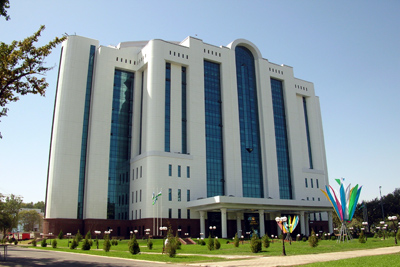
Presentation of the European Initiative “Covenant of Mayors– East” in Uzbekistan
Invitees of the Meeting are representatives of the Cabinet of Ministers, Ministry of Economy, Ministry of Finance, State Committee of Environmental Protection, Hokimiats of cities and oblasts of the Republic of Uzbekistan, leading experts in the sphere of energy conservation and energy efficiency as well as international institutions: the Delegation of the European Union to the Republic of Uzbekistan, United Nations Development Programme (UNDP) in the Republic of Uzbekistan, German Society for International Cooperation (GIZ), European Bank for Reconstruction and Development (EBRD), Asian Development Bank (ADB), DIW econ etc.
What is the advantage of the Initiative and how does it differ from others? Apart from sharing its enormous global and European experience in the sphere of energy efficiency and emission reduction “Covenant of Mayors– East” ensures access to newly independent states to state-of-the-art of energy efficient technologies and best practices. This opens up a channel for attraction of additional resources for their implementation with regard to national priorities and specifics of each individual state.
Active promotion of energy efficiency and use of renewable energy resources (RES) takes place at this point of time in the Republic of Uzbekistan within the framework of different legislative acts, specifically, the Law “On Rational Energy Consumption” of 25.04.1997. Compliant with the Resolutions of the President of the Republic of Uzbekistan №PP-1442 of 15.12.2010 “On Priorities of Industry Development in the Republic of Uzbekistan in 2011-2015” and №PP-1668 of 27.12.2011 “On Investment Programme of the Republic of Uzbekistan for 2012” which framework is planning the implementation of 54 investment projects for the total sum of more than US$7 billion is stipulated; to that end industry own funds as well as loan funds of international financial and economic entities such as World Bank, Asian Development Bank, Islamic Development Bank, Japanese Agency for International Cooperation and etc. will be used.
Regardless limited share of RES technology use, which is less than one per cent within the fuel and energy balance of the country, Uzbekistan has a huge potential for the RES utilization – up to 51 bln tons of oil equivalent, technical capacity of which makes up 179 82,3 mln of tons of oil equivalent.
In this respect the Initiative priorities are closely related to already developed strategic plans of the Republic of Uzbekistan in the sphere of energy efficiency and are designed to provide assistance within the framework of already existing national programmes targeted at achieving the country energy efficient potential.
The given Initiative is a continuously growing international community of leading local and regional government agencies that enjoy strong support of political (European Commission, Committee of the Regions, national and regional authorities and etc.) and international institutions (World Bank, European Investment Bank, European Bank for Reconstruction and Development, private banks and etc.).
The Covenant of Mayors is a flagship Initiative of the European Union, which unites local, regional and national authorities in achieving voluntary commitments on reduction of CO2 emission by at least 20% as of 2020 through increase of energy efficiency and introduction of renewable energy sources.
Since its launch in 2008 the Covenant of Mayors has become a leading initiative in support and encouragement of local governments in their development and implementation of sustainable energy programmes. Thus, the Covenant of Mayors contributes to development to environmentally oriented economy and improvement of the quality of life in the cities. How? By way of improved access to energy, job creation, better economic and social wealth and solution of problems related to climate change.
Offices of the Covenant of Mayors-East located in Lviv (Ukraine) and Tbilisi (Georgia) provide administrative, technical and informational support to the following countries: Armenia, Azerbaijan, Belarus, Georgia, Kazakhstan, Kyrgyzstan, Moldova, Tajikistan, Turkmenistan, Ukraine and Uzbekistan.